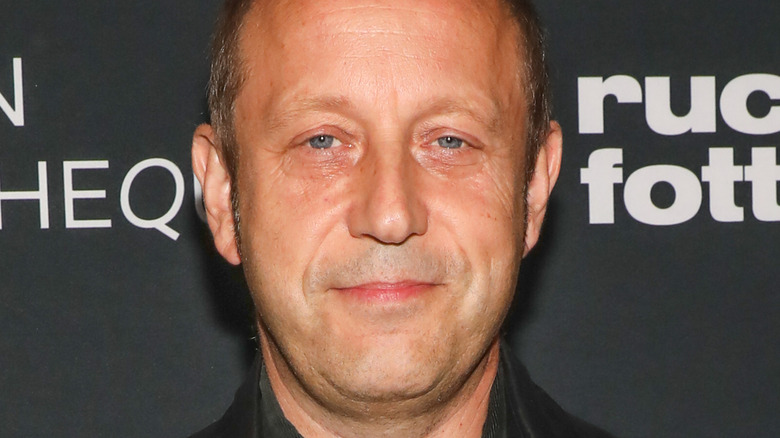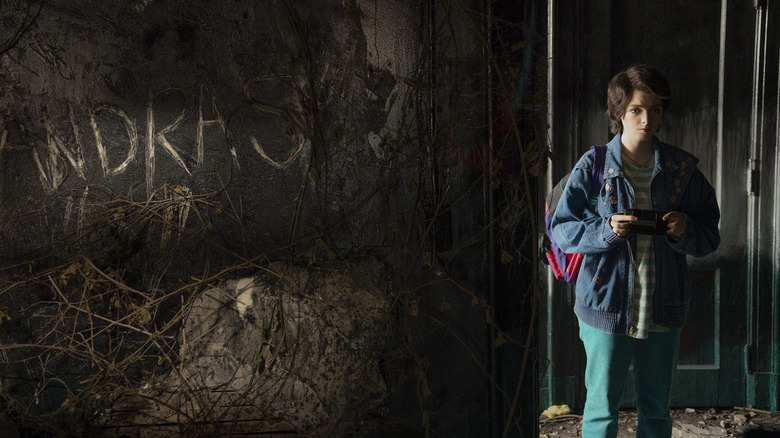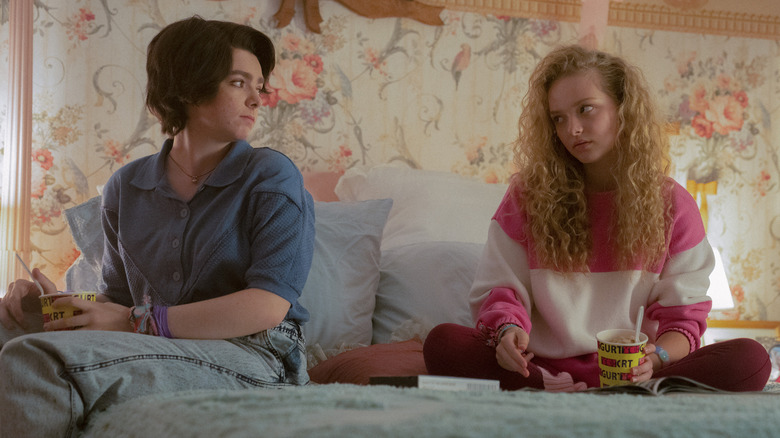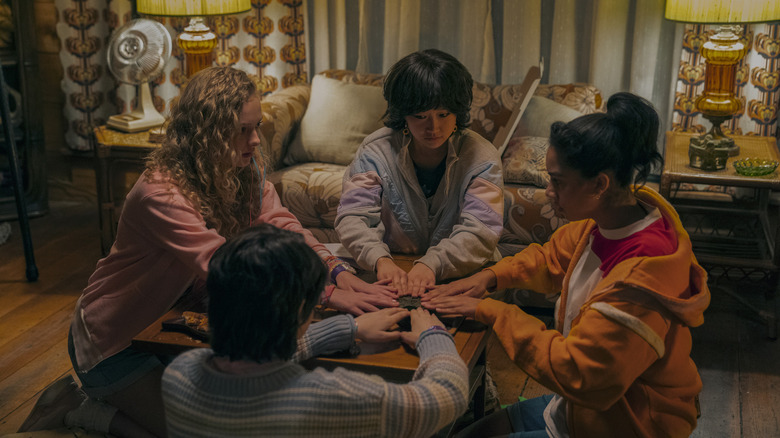Director Damon Thomas Discusses Balancing Tone With His Comedy-Horror My Best Friend's Exorcism - Exclusive Interview
Ever since director William Friedkin's fright-fest "The Exorcist" etched the terrifying idea of demonic possession and the procedure to remove it into the pop-culture consciousness, movies about driving away a demon have been terrifying audiences. Yet very few have used the ritual as a source of laughs. "My Best Friend's Exorcism" is the exception. In his feature directorial debut, Damon Thomas has ensured the '80s-set movie features all the terror and dread we've come to expect from an exorcism film while lacing the story with plenty of humor that will keep audiences chuckling even as they're cringing in terror.
The film centers on Elsie Fisher's Abby and Amiah Miller's Gretchen, Boy George-worshipping teenage besties who encounter more than they bargain for when they stumble into an abandoned house during a slumber party. When Gretchen starts to change, becoming the ultimate mean girl, Abby does everything in her power to figure out what's happening to her friend, and when she realizes what's really going on, she enlists the help of the woefully underqualified but remarkably enthusiastic Christian Lemon (Christopher Lowell), a bodybuilder for Christ, to hastily perform the title act. It's a candy-coated swirl of a movie that never shies away from the dark corners of the teen experience, whether it's due to the presence of a demon or not.
Thomas, a veteran director of TV shows like "Penny Dreadful," "Dracula," and "Killing Eve," sat down with Looper to discuss what appealed to him about "My Best Friend's Exorcism," how he balanced the story's combination of horror and comedy, and why a box of Hamburger Helper played an important role in one of the film's funniest one-liners.
Establishing a unique tone with My Best Friend's Exorcism
You've directed a lot of TV, but this is your first feature film. What attracted you to this particular project?
As a director, you're always looking for opportunities. The script was sent to me. Jenna Lamia [wrote] the script, and I really liked it. I thought it was a real opportunity to do a friendship movie that was wrapped up in a demonic possession. I'm quite interested in tone, from doing "Dracula" and "Penny Dreadful" and "Killing Eve." I quite like [when] you can have things that are scary and funny and mix those things together, but in a truthful way. And I love the '80s. I love the music. I grew up in the '80s.
"My Best Friend's Exorcism" is a mix of comedy and horror. What was your process for balancing the two?
I think it's really interesting. The first assistant director, Steve Moore, when we were shooting, he was going, "I didn't expect it to be like this." But I'm quite dialed in to that tone. It all comes down to, is it truthful to the character?
When the demon shows himself, Christian Lemon is over the moon. He's so excited that he's managed to do this, and that is truthful to that character because we've set him up so that you know he is slightly desperate to do an exorcism, and that's why it works. If you set things up properly, then [the audience] accept[s]. And watching it last night [at a screening] with 300 people [was] really interesting to watch how people love those moments with him.
You have to go at it with confidence. If you just start telling jokes, being silly, it doesn't add together. Also, it's something that you work on in edit. You dial it up and down to get the right mix.
Casting Elsie Fisher and Amiah Miller
Elsie Fisher and Amiah Miller were fantastic as the two main characters in the movie. They're both young, but they turn in very knowing performances. How did you cast them?
I loved [Elsie Fisher in] "Eighth Grade" and thought that you always need a point of view in a movie, someone who is sort of the audience, and we like rooting for her. You don't always need that, but it's quite nice. I watched a lot of tapes for Gretchen, and then I picked three to do some chemistry reads with Elsie. It was all during COVID, so it was all on Zoom. And Amiah came in and blew us away. We thought, "She's great."
What was great is that when we were filming, all four [actors who played the teenage group of friends, which also included] Rachel [Ogechi Kanu] and Kathy [Ang], they all got on so well. They literally were that group of friends, and it was great to see them together. I thought, "That will really start to work on screen."
As a former teenage girl, I could relate to them.
That's great. Also, [it's] good having an American woman [writer] who's also been a teenage girl in high school. I could ask [her] some of the questions.
One of the interesting things was we've never had Hamburger Helper in the U.K. So when Hamburger Helper was in the script, I said to Jenna, "We should make sure that she is holding the box like she's just out to make it." So even if you don't have that reference growing up culturally, it's something you understand. You get it; you get that moment. [During a screening] when she walks out and said, "Her hamburgers don't need help," everyone went, "Oh." They had a big [reaction].
Examining real-world issues through the lens of horror
This movie also deals with some serious issues, like sexual assault and body image issues. For teen girls, those are a big deal, but the parents and the teachers in the film are oblivious, which could be seen as funny or tragic depending on your perspective. What did you want to convey about those topics and the way that adults handle them through the film?
The '80s are interesting because there's a total lack of information. We all lived [much] smaller lives. In lots of ways, we have smaller lives now. We have regular things we do all the time, and we have a little [wrap-around] of life, but we are exposed by the internet to thousands and thousands of opinions and ideas and information. But in the '80s we never had any of that, so people were less informed, and therefore, wherever you lived, you lived in a quite parochial, uninformed way. As a child, you only have your parents as a source of cynical views, and then you might occasionally meet someone else's parents.
The way I remember, definitely back then, the way people used to talk about sexuality, it was very not a discussed thing. I thought it was very interesting that [the parents in the movie] don't want to think about their daughter when [sexual assault] is mentioned. Then the parents go, "You took drugs?" That's the thing that upset them. It was interesting at the time, in a way. I remember saying to my mother about a friend of mine at school, "Lee said he's gay." And my mom said, "It's just a phase," very confidently. Because if people didn't have openly gay friends, they didn't think they knew any gay people, so it was this unknown territory.
I think that is something that's part of that time, an ignorance and a lack of open discussion and people being free enough to talk about themselves. That tamping down of things was very much part of the '80s in smaller communities that weren't very cosmopolitan. Sexuality and things like that are very complicated issues, and we're still pushing back boundaries now and it's 40 years later.
Also, teenagers are cruel to each other. People were quite cruel in a way that was really unthinking. [Abby and Gretchen's friend] Margaret [played by Rachel Ogechi Kanu], when she's in bed and Abby goes to see her, she says, "I was such a b***h. I should never have laughed at her." She knows, and that's what I quite like about the horror genre. Because Gretchen is possessed, she can be very cruel and manipulate people, but it allows you to look at those issues through the lens of horror.
"My Best Friend's Exorcism" is available on Prime Video.
This interview has been edited for clarity.



